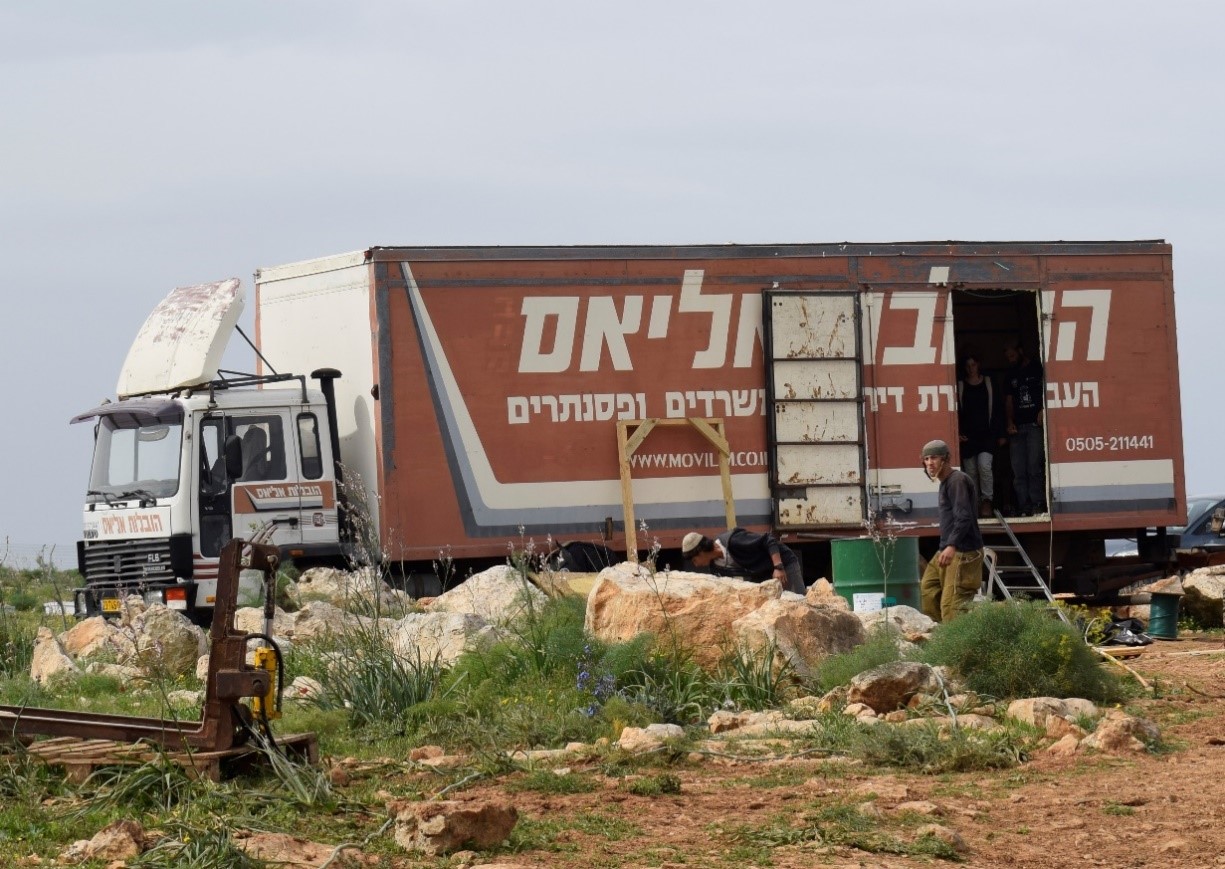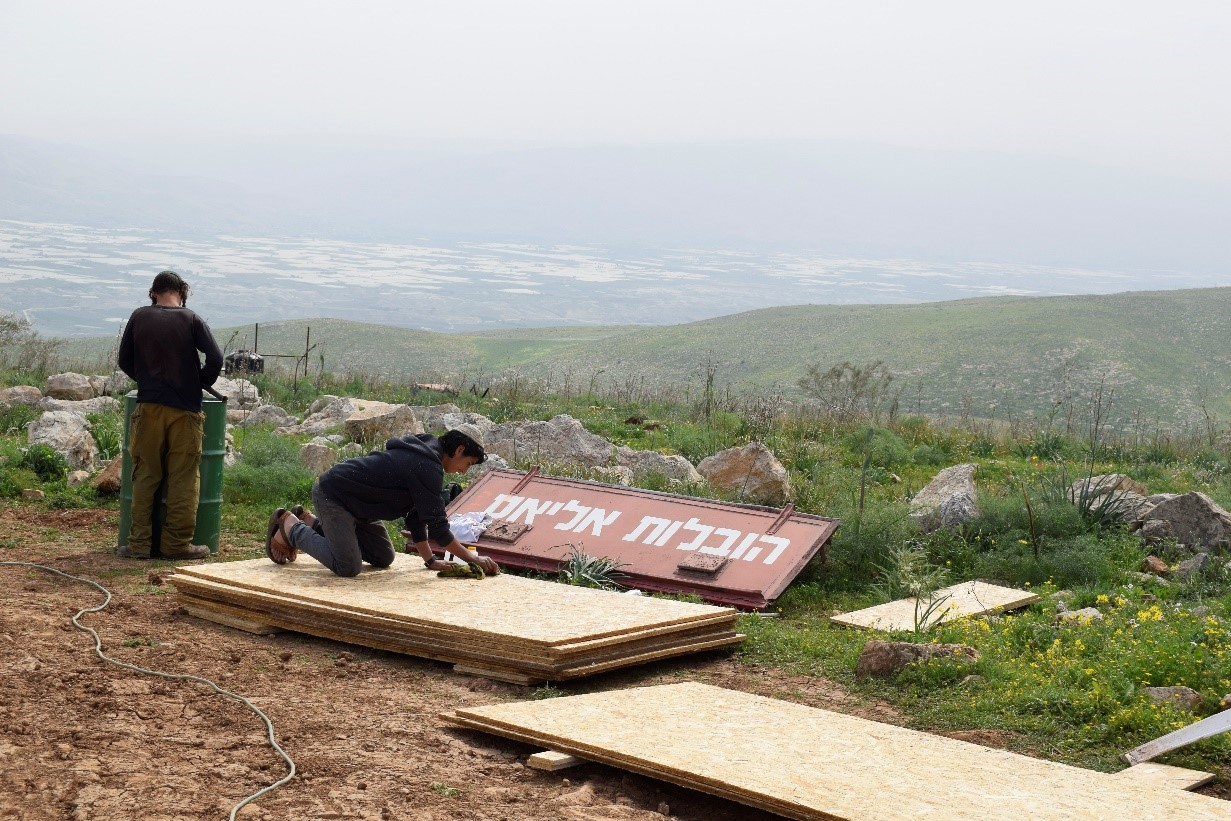Jordan Valley: Settlers-colonist assault violently Palestinian shepherds

Settler-colonists from Maskiyot and the new illegal colony outpost near Giv’at Sal’it and in Umm Zuka violently assault the Palestinian shepherd communities in the region. Every time the shepherds venture out to the now-green pasture areas they take a heavy risk.
The settler-colonists arrive nearly daily, some of them on horseback, and threaten the Palestinians with weapons and rocks. Thus they manage to chase off the shepherds and their flock back to their dwelling area. The dwellers of the new settler-colony outposts located on stolen land have adopted a farmers’ lifestyle, an effective way of taking over lands and robbing them from the local shepherd communities. One of their ways is to violently block the way for the Palestinian shepherds and prevent their flocks from grazing. We have learned both from the Taayush volunteers’ actions in recent months and from our own experience on our shift on February 21, that when Israeli activists accompany the shepherds, the settlers leave.
Al Hema. We drove out at 7 pm towards Al Hema in the Palestinian Jordan Valley, after coordinating to accompany the R. family’s shepherds to their grazing area, south-west of the Giv’at Sal’it outpost and its newest outshoot. The father of the family told us that R. ascended the hi8ll about an hour ago. Our presence was not crucial. Two days earlier an agreement was reached between the Israeli and the Palestinian DCOs. If we do not accompany the shepherds, there would be no problems. This is what the shepherds were promised.
En Al Hilwa. A visit at the home of Q. The mother is on the hill near home, with the grazing sheep. One of the sons has gone out to graze the cows near En Zuka. This is the only place they have left to graze after being chased away by the settler-colonists from nearer fields. The walk with the flock to that pasture takes over an hour. M. told us of confrontations he had had a week earlier with Rami, the security official of Maskiyot colony.
Umm Zuka

dwelling purposes Um Zuka 28.2.2017 photo Nurit Poper

Um Zuka 28.2.2017 photo Nurit Poper
construction is underway. A group of young settler-colonists, among them a young woman, are working next to the “Elias Movers” truck that was donated to this outpost about two weeks ago. They were busy cleaning and painting panels. We got the impression that they were preparing the truck to serve as a dwelling. Kobi, “owner” of this new outpost, who has already gained a reputation for threatening and harassing shepherds, was not seen on the spot. Nor was his cattle. They must have gone out to graze.
One day after our visit, settler-colonists from Umm Zuka stole 5 donkeys (Guy Hirschfeld of Taayush reported). Today a group of Taayush volunteers came to Umm Zuka to get the donkeys back. But these had been taken away at night, apparently with the sovereign authorities’ knowledge and blessing. Another way to harass the locals.
Samara. At the recommendation of Guy Hirschfeld of Taayush we visited a family living west of Umm Zuka. We met the father and his son. They told us that their troubles with the settlers began in December. Yesterday they had to cut short their grazing time. Armed settler-colonists harassed and threatened them. Today they did not go out to pasture for fear of being impacted once again. What will happen tomorrow? God only knows. The head of the family told us that the cultivated lands in the plain are officially registered under their name. Prior to the Israeli occupation of 1967 the uncultivable hilly area was under Jordanian rule but they had the right to graze their flocks there. At present their pasture area is limited because of the settler-colonists’ threats.
While we were in Samara, Guy called: a son of M. at En Al Hilwa who went out with the flock to graze on the hill near Maskiyot colony is being attacked by settlers. We decided to go up to Maskiyot and check out the situation. We were not allowed into the settlement but we called Rami, the Maskiyot security official (and fear of the shepherds) from the gate. After he denied that the shepherds were being harassed, we called the police. The policeman who received our complaint asked for details. Who attacked whom, how, and the size of the herd. He said he would pass on the complaint to those responsible.
En Al Hilwa- We proceed to M.’s place to find out whether our complaint with the police had worked. We got there after receiving a call from Guy the Maskiyot shepherds continue to frighten and threaten the boys who are out with their flock on the nearby hill. While we were speaking with M. his phone rang. His shepherd son reported that he was still being harassed and threatened if he doesn’t leave the hill. We decided to proceed with M. himself to this pasture, but before this there was another call with someone from the police, and told him that the Civil Administration would be admonished. About 10 minutes later the son called and said that the settler-colonists had left the grazing area.
would be admonished. About 10 minutes later the son called and said that the settler-colonists had left the grazing area.
